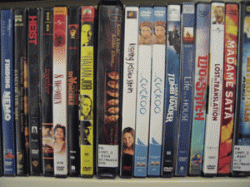Online service helps users trade DVDs

Your old DVD of "The English Patient" has been sitting on your shelves since you got it; meanwhile you want to get the DVD of "Saw II" but don't want to pay $20 at a retail store. How do these relate? If you're a user of online service Peerflix, you can trade your DVDs for different movies at just 99 cents per trade plus the cost of a stamp.
Peerflix, which was unveiled in September 2005, uses a peer-to-peer approach to movie sharing.
"Peerflix lets people take DVDs they have laying around collecting dust, and trade them for movies they want to see," said Billy McNair, co-founder of Peerflix.
McNair said that he and co-founder Danny Robinson conceived the idea in 2003, when McNair realized that he was buying children's DVDs for his young daughter that Robinson already had for his daughter and didn't use anymore.
Today, Peerflix boasts 200,000 users, all in the United States and Canada, according to McNair. He also estimated that tens of thousands of trades take place per month, with that number "scaling exponentially."
Users keep a list of what DVDs they want, as well as what movies they have available to send out. Peerflix matches users up based on geography and waiting time.
When Peerflix asks a user to send a DVD, they supply a document that users print out and fold, creating a pre-addressed envelope in which to send the disc. At the same time the user is sending that disc out, he should be receiving his requested DVD from another user.
Peerflix charges 99 cents per trade, with no subscription fee, though McNair said Peerflix is currently devising a subscription-based plan for high-volume users.
Once a trade is made, the user now owns his new DVD and can keep it or re-trade it as he sees fit.
"A key feature of Peerflix is the legality of it," McNair said. "Because ownership does transfer, the Peerflix model is a full legal service."
Peerflix runs an internal currency system called Peerbux, which assigns values to the discs being traded. Generally most movies are worth 2 Peerbux, with new releases worth 3 and low-value discs worth 1.
Multi-disc sets such as television show box sets are worth more, depending on the number of discs in the set.
When a user trades his DVD, he is credited the appropriate amount of Peerbux, which he can then put towards DVDs he wants to acquire. McNair said this is done to keep people from getting rid of their bargain-rack DVDs in exchange for popular releases.
"We're trying to protect against users taking older, lower-value titles and being able to trade them equally for 'Crash' or 'Walk the Line,' for example," said McNair.
In addition to gaining Peerbux by sending out DVDs, users can also purchase them for $5 apiece.
McNair noted that because of the quick turnover time, new releases are often available immediately when they are put on sale.
"Immediately, there are always new titles the day they come out in the system," he said. "Every title, new release or otherwise, is out there."
McNair said that while availability improves after getting past the release date, "the availability of titles rivals what you would find in any retail segment."
Though many are focused on the online future of films, McNair said he is not concerned with online films muscling DVDs out of the market.
"If you look at real data, (online) is a ways off," he said. "There's a very limited amount of content available, and there will be very little for years to come."
McNair said he believes that DVD will be the primary means of viewing movies at home for at least the next five years.
"The average consumer isn't going to be using (the Internet) to watch films for a while," he said.
Copyright 2006 by United Press International

















